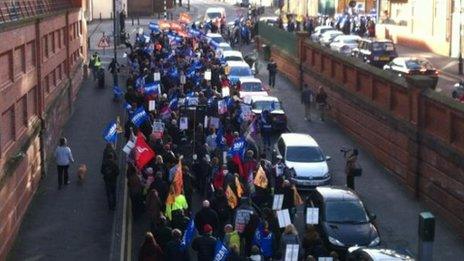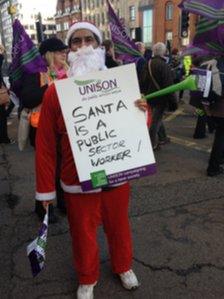About 4,000 public sector workers march in Birmingham
- Published

Thousands took part in a march to the National Indoor Arena in Birmingham
About 4,000 public sector workers have marched through Birmingham ahead of a pensions rally in the city.
Council workers, NHS employees and police support staff were among those taking action.
Hundreds of schools across Birmingham, the Black Country and Solihull were closed or partially shut.
Local authorities in the West Midlands said they had made contingency plans to minimise disruption as people walked out over pension changes.
Roger King, general secretary of Birmingham National Union of Teachers (NUT), said earlier that the city would "see tens of thousands out on strike".
"We refuse to pay 50% more and work up to eight years longer in order to get pensions that are worth a third less," he said.
Secretary of State for Education Michael Gove said public sector unions "want to provide a platform for confrontation just when we all need to pull together" and said it was "unfair and unrealistic" to expect taxpayers to foot the increasing public sector pensions bill.
On Wednesday afternoon Mr Gove said the strike had had a "severe impact" on schools.
Les Jones, leader of Dudley Council, said it had been working on contingency plans for some time to ensure any disruption was kept to a minimum but said it was "inevitable" some services would be affected.
Wolverhampton City Council's chief executive Simon Warren said the council would do all it could to minimise the impact of any disruption.
"I can report critical services for the most vulnerable and life-and-limb situations are to be covered to at least the level we would operate for Christmas Day," Mr Warren said.
UK Border Agency workers were also taking action and Birmingham Airport said it would support contingency plans being put in place by the agency.
The union Unison said some West Midlands police workers, such as control room operators and forensic staff, had also joined the action.
'Lollipop ladies' tax'
In a statement, West Midlands Police said they wanted to "reassure the communities of the West Midlands that we are managing resources across the force to ensure the best possible service to our communities".
Nurses, paramedics, cleaners, porters and receptionists at Birmingham Women's Hospital were among those who walked out at midnight in the row over pensions.
James Anthony, a cardiac nurse at the city's Queen Elizabeth Hospital, said it was the first time he taken part in industrial action while working there but there had been good support.
"We've had a good reaction today - horns being beeped and food being brought to the picket lines.
"It's the first time I've been on strike at the hospital - for nearly everyone - and it's been a new experience for all of us.
"People were worried what it would entail but the nerves will have gone after today and we feel we have made a difference.
"By striking, it has taken some of the myth away and given people confidence that they can stand up for their rights."
Unions told BBC News that they decided not to pay a road closure fee to the city council. Stewards said they were confident of public safety.
Motorists were either stuck in the crowds or had to turn around to avoid marchers.
TUC general secretary Brendan Barber told the rally in Birmingham the government had scrapped a bankers' bonus tax and replaced it with a "teachers', nurses' and lollipop ladies' tax".
He said no-one took industrial action lightly or wanted to inconvenience the public, adding: "When unfairness is piled on injustice you are right to take a stand."
Dave Prentis, Unison general secretary, said "history had been made" by workers taking industrial action on Wednesday.
'Join a union'
The rally also heard from union members, some of whom were first-time strikers.
At Wolverhampton University, members of the University and College Union (UCU) and Unison were on strike.
The university's Unison branch secretary Meena Jefferies said: "Although we know that going on strike is the last thing members want to do, after nine months of difficult negotiations with the government they have stopped listening to us.
"They have left us no alternative but to take action to impress how strongly we feel about the unnecessary and unjust changes to our pensions."

Council workers are among those taking action
West Midlands Ambulance Service urged the public to use the 999 service as sparingly as possible because a number of staff - about 8% - were taking part in the strike.
More than 500 schools were closed out of a total of about 960 across Birmingham, Solihull, Walsall, Wolverhampton and Sandwell and Dudley.
Birmingham's Central Library was also closed.
James Morris, Conservative MP for Halesowen and Rowley Regis, said: "What the government is trying to do is address the long-term problem in Britain of the sustainability of public sector pensions."
He said the government's new offer protected people retiring in 10 years.
"Today's action is completely unjustified," he added.
Eleanor Smith, a nurse and the president of Unison at Birmingham Women's Hospital, said no-one who worked in the public sector took the decision to strike lightly.
She said: "This is my first time in 30 years as a nurse I've felt compelled to take this decision."
Daniel Carins from Smethwick, was not taking part in the protests but said: "I'm confused by people complaining about how in the private sector you don't get this and you don't get that, so you have no sympathy for the strikers.
"That's even more reason why you should be angry at the government and Labour for creating the conditions for this crisis.
"Join a union and campaign for better rights, pensions and pay. Don't just stand back like sheep whilst the rich walk all over you so they can carry on as before."
- Published10 September 2012
- Published1 December 2011
- Published1 December 2011
- Published30 November 2011
- Published28 November 2011
- Published25 November 2011